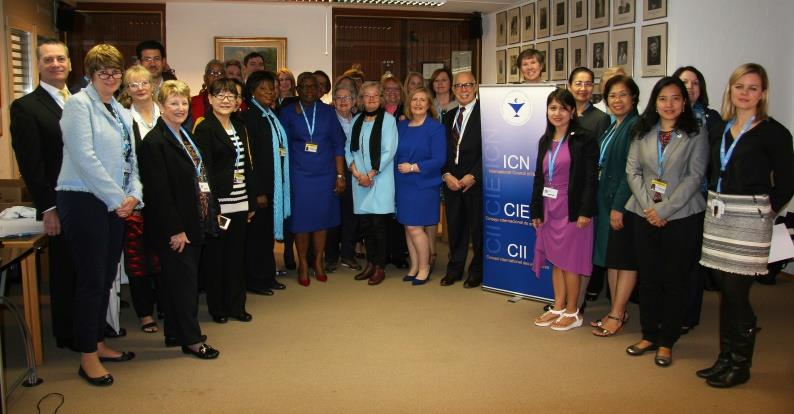Geneva, Switzerland, 31 May 2016
Leading a delegation of 69 participants, the International Council of Nurses (ICN) spoke to a number of key agenda items at the 69th session of the World Health Assembly (WHA) in Geneva, 23-28 May.
Speaking on behalf of nursing, as well as in partnership with the representatives of the other health professions, ICN made interventions and statements on the Draft global plan of action on violence; Health in the 2030 Agenda for Sustainable Development Goals; the Draft global strategy and plan of action on ageing and health; the Global action plan on antimicrobial resistance; Promoting the health of migrants; Health workforce and services; and the Global Strategy on Women’s, Children’s and Adolescent’s Health.
Draft global plan of action on violence
Highlighting the leading role that nurses play in addressing violence, as the first point of care for elder abuse, intimate partner violence, conflict, post-conflict and humanitarian settings, ICN confirmed its commitment to working with governments to implement this action plan, which calls for improved access to quality health care by eliminating discrimination and violence in the health work place, patient-centred and gender sensitive services, and promotion of human rights.
Health in the 2030 Agenda for Sustainable Development Goals
ICN called upon WHO and governments to continue to actively involve nurses in the planning and development of relevant policies and strategies, and called for a system-wide investment in universal health care (UHC), with a primary focus on health promotion and prevention of illness. ICN emphasized the central role of nurses in addressing NCDs, substance abuse, traffic accidents and injuries, sexual and reproductive health, environmental safety, and affordable, accessible models of care.
Multisectoral action for a life course approach to healthy ageing: draft global strategy and plan of action on ageing and health
ICN believes that a strong Primary Health Care system is key to improving the health and wellbeing of older people. With this intervention, ICN called on governments to remove regulatory barriers in order for nurses to carry out their role in preventing, identifying and treating age-related illnesses, thereby facilitating the shift to primary health care.
Global action plan on antimicrobial resistance
ICN believes the success of the global efforts to combat AMR largely depends on the extent to which the millions of nurses around the world are mobilised and diligent in tackling this major public health threat. It called for coordinated and sustained efforts in reducing global AMR and promotes the collaboration of nurses, consumers, physicians, pharmacists, and veterinarians as well as the environmental and agricultural sectors.
Promoting the health of migrants
ICN agreed that the inclusion of migrants’ health in the development of regional and national health strategies is essential for the dialogue and cooperation necessary to address their specific health challenges. Nurses play a central role in addressing the physical and mental health challenges of refugees and migrants. Therefore, ICN encouraged WHO and governments to continue to work co-operatively with nurses in their examination of the extent of the problem in their countries.
Health workforce and services
ICN strongly supports the strategy to reorient health systems towards primary health care and people-centred health services. Strengthening health systems can only be achieved through investing in nursing and midwifery as part of strengthening human resources for health, which is a fundamental strategy for the successful achievement of the Sustainable Development Goals. ICN, therefore, affirmed its commitment to continue working with WHO and governments to strengthen health systems through HRH strengthening capacity. It urged WHO and its Member States to ensure that nurses are involved in every aspect of the policy making agenda of these proposed health workforce strategies.
Operational plan to take forward the Global Strategy Women’s, Children’s and Adolescent’s Health
The World Health Professions Alliance (WHPA) made an intervention supporting the Global Strategy on Women’s, Children’s and Adolescent’s Health and emphasizing the essential need for effective planning and financing for an adequate and competent health workforce that meets the current and future needs of populations.
The WHA concluded Saturday 28 May with several resolutions adopted on a broad range of health issues. The six days of discussions involved over 3500 participants, including health ministers and senior health officials from amongst the 194 WHO Member States, as well as representatives from civil society and other stakeholders.
Note for Editors
The International Council of Nurses (ICN) is a federation of more than 130 national nurses associations representing the millions of nurses worldwide. Operated by nurses and leading nursing internationally, ICN works to ensure quality care for all and sound health policies globally.
For further information contact Lindsey Williamson at: media@icn.ch
Tel: +41 22 908 0100; Fax: +41 22 908 0101
http://www.icn.ch



